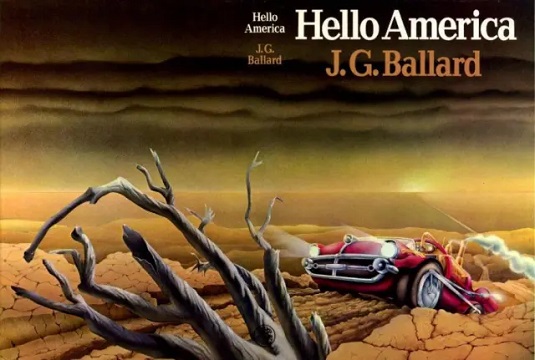
Despite Ballard's deserved reputation as a serious writer, a keen sense of the absurd suffuses his most celebrated novels. His classic slipstream of the 1970s all feature it. The far-fetched subculture of car smash fetishists in Crash, the feral descent of nice middle class people trapped in their ultra modern skyscraper in High-Rise, and the Robinsonade survival of a man stranded on the liminal wasteland between busy highways in Concrete Island demand suspension of disbelief, and they work. Hello America initially reads as if it could be considered as part of their feted piece. That the United States would wind itself up is a nonsense, but no dafter than other conceits in the Ballardian oeuvre. And this works for half of the book.
The descriptions of dunes spilling between Manhattan's towers, the sand blasted suburbs, and New York's animal residents observing the arrivals fresh off the boat are pitch perfect. This is the ultimate Ballardian terrain: the imagined desolation of the world's most famous skyline. For example, describing city life smothered by desert and reclaimed by nature,
On all sides was a secret but rich desert life. Scorpians twitched like nervous executives in the windows of the old advertising agencies. A sidewinder basking in a publisher's doorway paused to observe Wayne approach and then uncoiled itself in the shadows, waiting patiently among the desks like a merciless editor. Rattlesnakes rested in the burrow-weed on the window-sills of theatrical agents, clicking their rattles at Wayne as if dismissing him from a painful audition (p.35)
We are quickly introduced to the new native Americans - the few thousand left behind after the scramble for the boats. All are hunter/gatherer tribes modelled on Americal archetypes. The Executives ride around on their camels bedecked with ties. The Gangsters carry guitar cases, while its female members apply peroxide in imitation of the molls. The Divorcees are reputed to be a tribe of women occasionally partial to the odd, unwary young man. And of the Executives our explorers meet, they're all named after brands. All very silly and not the most subtle commentary on the US. But if the novel stayed in this vein as the characters started making their way into the dust bowl interior, it could have been another triumph. But then, just as we reach the jungle around Las Vegas, Hello America goes completely off the boil.
It's hard to put a finger on what goes wrong. The changing pace from road narrative to sitting around and waiting for things to happen? The abrupt resolutions of two complex and potentially troublesome characters. The self-proclaimed president of the USA styling himself as Charles Manson. Theatre performances of robot Frank Sinatras and Dean Martins in front of mechanical audiences. A parade of androids of presidents past leading an assault on a casino. And the revelation bombs are getting exploded over deserted American cities to keep the contagion of people away. Taken together it's too clunky and too on the nose. Yes, we know the office of the American presidency is structurally psychotic so why not have a noted sociopath in the chair? But more than this, it commits a sin one does not normally associate with Ballard's books. It becomes dull. Expertly written, but tedious. Hello America left me wanting to say "goodbye America".
Perhaps he got fed up writing the book. Perhaps it was too much a purist throwback to his genre roots. Or that he had an engaging premise, was able to go to town on the scorching desertification of America's suburbs, but not much of an idea to do with the rest of the tale - not unlike what happened with Lost. And lost Hello America certainly is. Technically, there's a lot to like in the first half. But when all's said and done, there's a reason why this book is something of a forgotten Ballard.
No comments:
Post a Comment